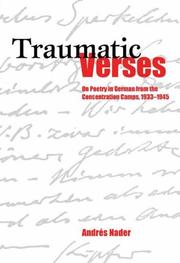| Listing 1 - 2 of 2 |
Sort by
|

ISBN: 1571133755 9781571133755 9781571137067 9781571134806 1571134808 9786612150609 128215060X 1571137068 9781282150607 Year: 2007 Publisher: Rochester, N.Y. : Camden House,
Abstract | Keywords | Export | Availability | Bookmark
 Loading...
Loading...Choose an application
- Reference Manager
- EndNote
- RefWorks (Direct export to RefWorks)
Auschwitz, Buchenwald, Christianstadt, Dachau. The names of Nazi concentration camps evoke images of radical destitution. The atrocities we call the Holocaust defy comprehension, while thinkers continue to ponder the possibility of 'poetry after Auschwitz.' And yet a number of people composed poems while imprisoned in the camps. Unlike most documents about the camps, these poems are self-representations that convey the perspective of the inmates who wrote them. 'Traumatic Verses' provides psychoanalytically informed close readings of a range of poems and discusses their significance for aesthetic theory and for research on the camps. It also tells the stories behind the composition and preservation of these poems and the history of their publication since 1945. Most of the poems appear here for the first time in English translation along with the original texts. This book fills a gap left by literary historians, who have mostly ignored writings from the camps and avoided careful scrutiny of literature produced under the Nazi regime. Studies of trauma have concentrated on post-traumatic experiences; discussions of aesthetics 'after' the Holocaust have neglected the issue of the artistic impulse 'in' the camps. On both counts this book constitutes a unique contribution to scholarship, showing that, when read attentively, the poems written in the camps are invaluable sites for confronting the Nazi past. Andrés J. Nader is Project Manager at the Amadeu Antonio Foundation in Berlin, and lectures at the Humboldt University. Winner, 2008 Modern Language Association Book Prize for Independent Scholars; from the statement of the Selection Committee: Leading a new generation of students of the Holocaust, Nader persuasively analyzes the psychological needs and motivations behind ... poetry composed in the concentration camps. Displaying a strong command of trauma and pain theory, as well as the prior history of Holocaust studies, [Nader] illuminates the role of poetry in the camp inmates' reclamation of the German language and cultural heritage. Offering many poems in English for the first time, in elegant translation, Nader's anthology and commentary add a significant new dimension to Holocaust studies.
Concentration camp inmates' writings --- German poetry --- Holocaust, Jewish (1939-1945) in literature --- World War, 1939-1945 --- World War, 1939-1945, in literature --- Writings of concentration camp inmates --- Literature --- History and criticism --- Literature and the war --- Nazi concentration camp inmates' writings --- Holocaust, Jewish (1939-1945), in literature. --- History and criticism. --- Literature and the war. --- Writings of Nazi concentration inmates --- Aesthetic theory. --- Andrés J. Nader. --- Close readings. --- Concentration camps. --- Holocaust. --- Inmates. --- Nazi past. --- Poetry. --- Psychoanalytically.
Book
ISBN: 9782760621336 2760621332 2821897685 2760626636 Year: 2010 Publisher: Montréal: Presses de l'Université de Montréal,
Abstract | Keywords | Export | Availability | Bookmark
 Loading...
Loading...Choose an application
- Reference Manager
- EndNote
- RefWorks (Direct export to RefWorks)
Prendre l'Histoire à rebrousse-poil pour faire entendre les voix de ses victimes ; exposer la barbarie que cachent la culture et le progrès technique ; montrer que la mémoire n'est pas l'affaire du passé, mais du présent et que l'écriture peut et doit faire justice. Telle est l'entreprise d'Esther Cohen, qui s'inscrit entre autres dans le sillage de Walter Benjamin et Jacques Derrida. Son livre se veut, comme les œuvres qui le nourrissent, un acte de résistance contre le silence et l'indifférence qui ont été les complices de la Shoah comme des nombreux massacres qui ont continué de dévaster le monde contemporain. Primo Levi, Jean Améry, Jorge Semprun, Imre Kertész, mais encore Hannah Arendt, Albert Camus ou même Franz Kafka : les auteurs rassemblés dans cet ouvrage ont vécu les camps, en ont été les témoins historiques, ou en ont eu le sombre pressentiment. En les réunissant, Esther Cohen fait entrer en résonance quelques-unes des œuvres capitales du XXe siècle.
Holocauste, 1939-1945, dans la littérature --- Littérature juive --- Ecrits de détenus de camp de concentration --- Histoire et critique --- Auschwitz (Pologne : Camp de concentration) dans la littérature --- Holocauste, 1939-1945, dans la littérature. --- Littérature juive --- Écrits de détenus de camp de concentration --- Holocaust, Jewish (1939-1945), in literature. --- Jewish literature --- Concentration camp inmates' writings --- Histoire et critique. --- History and criticism. --- Auschwitz (Pologne : Camp de concentration) dans la littérature. --- Auschwitz (Concentration camp) --- In literature. --- Writings of concentration camp inmates --- Literature --- KL Auschwitz --- Oświęcim (Concentration camp) --- Konzentrationslager Auschwitz --- Oshṿits (Concentration camp) --- Aušvic (Concentration camp) --- KZ Auschwitz --- Auschwitz I (Concentration camp) --- Concentration camp "Auschwitz" --- CC Auschwitz --- אוישוויץ --- אושוויץ --- אושוויץ (מחנה-ריכוז) --- מחנה אושווינצ׳ים --- Osvent︠s︡im (Concentration camp) --- Aushvit︠s︡ (Concentration camp) --- Nazi concentration camp inmates' writings --- Writings of Nazi concentration inmates --- Освенцим (Concentration camp) --- Aousvits (Concentration camp) --- Аушвіц (Concentration camp) --- Littérature juive - 20e siècle - Histoire et critique --- Ecrits de détenus de camp de concentration - Histoire et critique --- littérature juive --- camp de concentration --- Shoah --- littérature --- Auschwitz
| Listing 1 - 2 of 2 |
Sort by
|

 Search
Search Feedback
Feedback About UniCat
About UniCat  Help
Help News
News